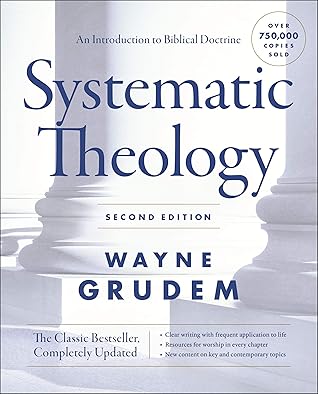More on this book
Community
Kindle Notes & Highlights
by
Wayne Grudem
Read between
March 15 - December 27, 2021
3. God’s Words Are the Ultimate Standard of Truth
4. Might Some New Fact Ever Contradict the Bible?
Here we can say with confidence that this will never happen—it is in fact impossible. If any supposed “fact” is ever discovered that is said to contradict Scripture, then (if we have understood Scripture rightly) that “fact” must be false, because God, the author of Scripture, knows all true facts (past, present, and future).
it must be remembered that scientific or historical study (as well as other kinds of study of creation) can cause us to reexamine Scripture to see if it really teaches what we thought it taught.
Bible certainly does not teach that the earth was created in the year 4004 BC, as some once thought (for the genealogical lists in Scripture have gaps in them).12
LIBERAL PROTESTANT THEOLOGY UNDERSTANDS THE BIBLE TO BE MERELY HUMAN WORDS, NOT GOD’S WORDS
One of the primary features that distinguishes liberal Protestantism from evangelical Protestantism
according to liberalism, the Bible contains historical inaccuracies, internal inconsistencies, and, most importantly, outdated theological and ethical teachings that we must reject as unacceptable in today’s world.
dominant view, and in most cases the exclusive view, advocated in courses about the Bible or religion in most secular universities today.
Do you know of any proven fact in all of history that has shown something in the Bible to be false? Can the same be said about other religious writings such as the Book of Mormon or the Qur’an?
2 Timothy 3:16: All Scripture is breathed out by God and profitable for teaching, for reproof, for correction, and for training in righteousness.
HYMN “Standing on the Promises”
Author: R. Kelso Carter, 1886
“Here I Am To Worship”
The Inerrancy of Scripture Are there any errors in the Bible?
Inerrancy has to do with truthfulness, not with the degree of precision with which events are reported.
Objection: The Bible Is Only Authoritative for Matters of “Faith and Practice”
If we begin to examine the way the New Testament authors trust the smallest historical details of the Old Testament narrative, we see no intention to separate out matters of “faith and practice,”
eight persons were saved in the ark (1 Peter 3:20; 2 Peter 2:5);
The word Trinity does not occur in Scripture, nor does the word incarnation. Yet both of these terms are helpful because they allow us to summarize in one word a true biblical concept,
the original manuscripts are those to which the claims to be God’s very words apply. If we have mistakes in the copies (as we do), then these are only human mistakes.
Objection: The Biblical Writers “Accommodated” Their Messages in Minor Details to the False Ideas Current in Their Day and Affirmed or Taught Those Ideas in an Incidental Way
it is helpful to consult some commentaries on the text. Both Augustine (AD 354–430) and John Calvin (1509–64), along with many more recent commentators, have taken time to deal with most of the alleged “problem texts” and to suggest plausible solutions to them.
historical perspective on this question is helpful. There are no really “new” problems in Scripture. The Bible in its entirety is over 1,900 years old, and the alleged “problem texts” have been there all along.
EXAMPLES OF SOME DIFFICULT TEXTS
The Order of Jesus’ Temptations (Matt. 4:3–8; Luke 4:3–9). In Matthew, the order of temptations is (1) bread, (2) temple, (3) worship:
The Order of Theudas and Judas (Acts 5:34–39)
Some readers have thought that Luke (the author of Luke-Acts) made a historical error in reporting a speech by Gamaliel:
a better solution, it seems to me, is that Gamaliel in Acts 5 and Josephus are speaking about two different men, both of whom have the name of Theudas.
Take Sandals and a Staff or Don’t Take Sandals or a Staff? (Matt. 10:9–10; Mark 6:8–9; Luke 9:3)
in Luke as in Matthew, Jesus tells the disciples not to take along an extra staff.17
If We Deny Inerrancy, a Serious Moral Problem Confronts Us: May We Imitate God and Intentionally Lie in Small Matters Also?
If We Deny Inerrancy, We Essentially Make Our Own Human Minds a Higher Standard of Truth Than God’s Word Itself
Do you know of any Scripture texts that seem to contain errors? What are they? Have you tried to resolve the difficulties in those texts?
Psalm 12:6: The words of the LORD are pure words, like silver refined in a furnace on the ground, purified seven times.
“The Law of the Lord is Perfect”
Anonymous (from Ps. 19:7–11)
“Speak, O Lord”
Words by Keith Getty and Stuart Townend24
The Four Characteristics of Scripture: (2) Clarity Is it possible for us to understand the Bible rightly?
There are some things in them that are hard to understand, which the ignorant and unstable twist to their own destruction, as they do the other Scriptures” (2 Peter 3:15–16).
not all parts of Scripture are able to be understood easily.
THE BIBLE FREQUENTLY AFFIRMS ITS OWN CLARITY
The law of the LORD is perfect, reviving the soul; the testimony of the LORD is sure, making wise the simple. (Ps. 19:7)
REQUIREMENTS FOR UNDERSTANDING SCRIPTURE RIGHTLY
we need to give careful attention to the text of Scripture and allow it to define in what sense we should understand its clarity.
1. Time This first requirement reminds us that understanding Scripture is a process that does not happen all at once.
But his delight is in the law of the LORD, and on his law he meditates day and night. (Ps. 1:2; see also Ps. 119:15, 23, 48, 78)
Scripture affirms that it is able to be understood, but not all at once: growth in understanding is a lifelong process.
Clarity is a property of Scripture, not a property of its readers, who vary widely in their understanding.


